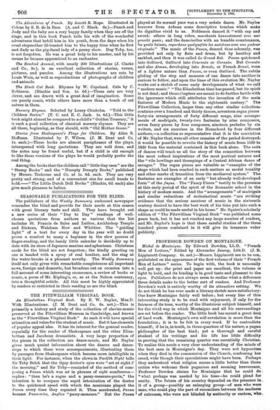PROFESSOR DOWDEN ON MONTAIGNE.
Michel de Montaigne. By Edward Dowden, LL.D. "French Men of Letters," Edited by Alexander Jessup, Litt.D. (j. B. Lippincott Company. 6s. net.)—Messrs. Lippincott are to be con- gratulated on the appearance of the first volume of their " French Men of Letters" series. To begin with, the book is unusually well got up : the print and paper are excellent, the volume is light to hold, and its binding is in good taste and pleasant to the eyes. Publishers do not always seem to realise what a difference these details make to the better sort of readers. And Professor Dowden's work is entirely worthy of its attractive setting. We do not think he has ever made a literary sketch more satisfactory- One knew Montaigne fairly well before; but every line of this interesting study is to be read with enjoyment, if only for the fairness of its tone, worthy of the illustrious subject himself, and for the vivid way in which Montaigne and all his surroundings are set before the reader. The little book has meant a great deal of hard work. Montaigne's own self-revelation is more than the foundation ; it is to be felt in every word. If he contradicts himself ; if he is, in truth, in three-quarters of his nature, a pagan philosopher of the best kind; yet a thorough and careful student of his writings and his life has little difficulty in proving that the remaining quarter was essentially Christian. To realise this needs a very clear understanding of the minds of the best men in Montaigne's day. They were not hypocrites. when they died in the communion of the Church, confessing her creed, wide though their speculations might have been. Perhaps• they understood what religion means a little better than those critics who welcome their paganism and seeming irreverence. Professor Dowden claims for Montaigne that he could do.. "what perhaps was needed by his time—he could plead for sanity. The future of his country depended on the presence in.. it of a group—possibly an enlarging group—of men who were sane, who could play the part of reconcilers between the madness of extremes, who were not blinded by authority or custom, who..
were universal questioners, who were pliable to the touch of reality, who dared to doubt as well as to believe, who took, as he did, the balance for their emblem, and who could pause to weigh things before they applied themselves to action. Of zeal and passion there was enough ; there was too much. It were better for France if men were less zealous if only they were more sane." Montaigne, probably, was not a hero ; but he was a great genius and a wise man, who knew his own limitations and those of his time. As to his influence, descending through the centuries, such a book as this is not among the smallest proofs of it.
THE WORLD'S NAVIES IN THE BOXER REBELLION.
The World's Navies in the Boxer Rebellion (1900). By Lieutenant C. C. Dix. (Digby, Long, and Co. 7s. 6d.)—The somewhat imposing 'title covers a most interesting narrative by a Midshipman of the events of the Boxer Rebellion. Those chapters dealing with the relief of Tientsin, the relief of Seymour, and thirdly, the siege of Tientsin, are the best. Published some time after the events treated, and probably much " written up " from rough notes, Lieutenant Dix's narrative has lost some of its original freshness, yet it presents us with clear pictures of several phases of the fighting, and throws, as one might expect, many sidelights on the behaviour of the troops. The author is honest, candid, and just to friend and foe, and while he handles names with reserve, he has no desire to save any one's face. He knows best the movements of the Naval Brigade, but he had admirable opportunities of seeing the Allies at work. In this regard his description of the second siege of Tientsin is most characteristic of his impartiality, of such graphic merits as his story has, and of his general marshalling of facts. It gives a very fair, accurate, and vigorous description of the final assault and the occupation and subsequent looting of the city. He makes a very ingenious defence of looting, though the British forces were some what late on the scene, and one detects a faitit flavour of regret in his allusion to the fact; and, as he says, it helped to drive home a necessary lesson. He has a sly hit at the civilians, who were certainly very much in evidence at looting tnise. The inevitable comparison between the Allied troops comes at the end of the book, and it is not flattering to some of them. An instance of Lieutenant Dix's thoroughness is afforded by his careful descrip- tion of the arms and equipment of the Allies and the enemy, the best and most succinct we have yet seen. As to the behaviour of the troops, we are reminded of the reply given to us by a Crimean veteran when asked "which of the five medals he was proudest -of." "The good conduct one," was the prompt answer; and that should be, and is, the attitude of mind of the English soldier. Lieutenant Dix's book should be read for its interesting and suggestive account of the earlier and more arduous part of the campaign, and can be recommended for its many details of actual fighting and for its general trustworthiness.



































































 Previous page
Previous page